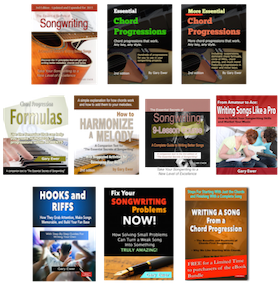 Give your songwriting talents their best shot – Check out “The Essential Secrets of Songwriting” eBooks.
Give your songwriting talents their best shot – Check out “The Essential Secrets of Songwriting” eBooks.
There are many causes of songwriter’s block, but regardless of its origins, it all manifests itself as being a fear of failure. It’s an unpleasant mix of distress and panic. As you pick up your guitar to get to work writing something, you can feel the dread. At that point, you’re already defeated, or at least so it seems.
At those times, and especially when writer’s block has been going on for a while with no end in sight, it’s often best to take a break of a few days or even weeks, and try to focus on creative activities that take the pressure off of writing. Playing your instrument, teaching, writing poetry — these are all activities that can keep you using your imagination, while taking the pressure off composing music.
There’s another cause of songwriter’s block, and it’s a bit sneakier, because it’s not obvious that it’s happening. It’s writer’s block that comes from suddenly realizing that all of your songs sound too similar.
 Having trouble coming up with a good hook for your next song? Time to try the ideas in “Hooks and Riffs: How They Grab Attention, Make Songs Memorable, and Build Your Fan Base“. It’s part of “The Essential Secrets of Songwriting” eBook Bundle package.
Having trouble coming up with a good hook for your next song? Time to try the ideas in “Hooks and Riffs: How They Grab Attention, Make Songs Memorable, and Build Your Fan Base“. It’s part of “The Essential Secrets of Songwriting” eBook Bundle package.
Basically, at least for the time being, you’ve run out of ideas. Your songs all start to sound the same, and now every time you pick up a pencil to write your next one, you feel you’ve got nothing new to say.
Characteristics of Song Similarity
When you feel that your songs are all sounding the same, you mean specifically:
- The tempos of your last few songs are the same or similar.
- You keep favouring the same keys.
- Your songs all use a similar backing rhythmic feel.
- Your songs all use the same design: verse-chorus-bridge, for example.
- Your lyrics all seem to keep coming back to the same topic, theme, or the same favourite catch-phrases.
- You use the same guitar-strumming intro for all your songs.
- You use the same few chords.
There are lots more, but you get the basic idea. So what happens is that you feel defeated before you even get going. You’ve just begun to realize that you haven’t said anything new through your music, at least not for a long while.
You’d think that realizing you’ve not done anything original for a while might be a catalyst for becoming more creative, but in fact the opposite is generally true. It starts to tie into the fear of failure — though in this case, it’s the fear of never being able to do anything creative again, and you feel stuck.
So before you let things get to that point, take a look at your last 5 to 10 songs and see if any of the seven characteristics listed above are making themselves evident. If you fear that you’re losing a grip on songwriting originality, here are some specific suggestions to help:
- Think about backing rhythm. The basic rhythmic feel of a song is noticed primarily on a subconscious level by your audience. Changing that feel can do wonders for completely changing how a song comes across.
- Work on a unique song design. Verse-chorus designs may come naturally to you, but there are ways to develop something unique and creative. Try an extended instrumental intro, or start with the chorus, or perhaps insert a section that changes key, tempo or time signature. The more you change, the more your imagination kicks in and develops new ideas.
- Change instrumental technique. One of the best things you can do, especially if you compose primarily on an instrument, is to take some lessons to improve and expand on your playing technique. That new technique won’t just improve your playing abilities; it will yield many new, exciting songwriting ideas. You won’t feel the need to start every song with mindless strumming.
- Experiment with more innovative chord progressions. If you’re always stuck playing the same 4 or 5 chords, it’s time to branch out. Verses are particularly good places for experimenting with something a little more complex. You might find this article to be helpful.
- Broaden your listening experience. If you’re always listening to the same groups, the same genres and the same performers, it’s time to expand your tastes. You’ll benefit immensely from absorbing another songwriter’s technique and putting some of their ideas to work for you.
That final point isn’t going to result in accidental plagiarism, so don’t worry about that. The more you expand on the kind of music you listen to, the more distinct and creative your own songwriting style will become.
All of these points result in a new influx of musical ideas, ideas that will result in songs that are, to your audience, pleasantly unpredictable and imaginative. You’ll feel your songwriting prowess coming back quickly. And most importantly, you’ll cure songwriter’s block before it gets beyond its first mild stage.
 Written by Gary Ewer. Follow Gary on Twitter.
Written by Gary Ewer. Follow Gary on Twitter.
 “The Essential Secrets of Songwriting” 10-eBook Deluxe Bundle comes with a deal. To see today’s special offer, read more.
“The Essential Secrets of Songwriting” 10-eBook Deluxe Bundle comes with a deal. To see today’s special offer, read more.











Pingback: When Song Similarity Turns Into Writer’s Block - The Hit Songwriting Formula | The Hit Songwriting Formula